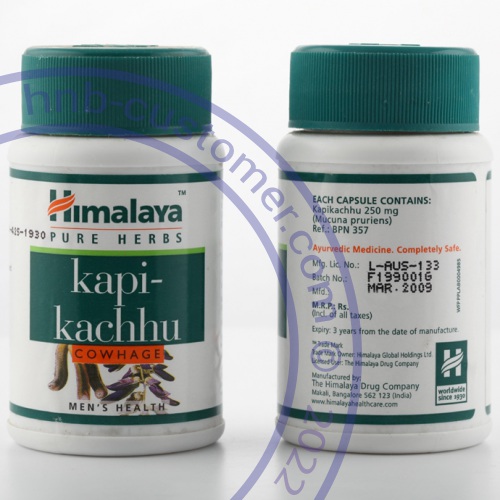Kapikachhu
Kapikachhu
Kapikachhu bottle
What is this herbal medicine?
KAPIKACHHU (Cowhage/Mucuna pruriens) has been used in Ayurvedic medicine to elevate sperm count and as an aphrodisiac. The herb is also helpful in normalizing nerve cell function. An authentic treatise on Ayurveda, the Charaka Samhita, promotes the use of Kapikacchu seeds processed and cooked into a sweet delicacy and eaten as an aphrodisiac. Researchers at the Harrison School of Pharmacy, Auburn, Alabama, found Kapikachhu to support normal neurotransmitter function, based largely on its antioxidant activity, which they said ‘significantly inhibited the oxidation of lipids,’ and ‘demonstrated an ability to scavenge DPPH (a chemical compound used to monitor chemical reactions) radicals, ABTS (a chemical compound used to observe the reaction kinetics of specific enzymes) radicals and reactive oxygen species’ (Phytotherapy Research, January 2008, 22(1):6-11). Researchers at the Department of Biochemistry, Chhatrapati Shahuji Maharaj Medical University, Lucknow, India, found that Kapikachhu also supports the normal function of the male reproductive system, and particularly supports normal levels of male fertility (Fertility and Sterility, October 28, 2008). Scientists at the King George's Medical University, Lucknow, India, agreed with the findings, adding that Kapikachhu supports the body's normal response to stress (Evid Based Complement Alternative Medicine, December 2007, 18). The hairs on the pods of the Kapikachhu plant are commonly used in itching powder to induce itching. In fact, some cultures call the herb ‘Cow Itch Plant’! This large climbing herb is found in abundance from the plains to lower hills along streams and river banks in Africa, the Caribbean and India.
Active constituents
L-dopa or levodopa is present in the seed as well as in the stem, leaves and roots. Levodopa is used as a drug precursor, to increase dopamine levels for the treatment of Parkinson's disease, since it is able to cross the blood-brain barrier whereas dopamine itself cannot. Other alkaloids found in the seed are mucuadine, mucuadinine, mucuadininine and prurienidine. L-dopa was first isolated from the seeds of Kapikacchu or mucuna pruriens in 1937, and when the value of L-dopa for the treatment of Parkinson’s Disease became known, scientific interest in plants rich in L-dopa was revived’ (Journal of Neurology, Neurosurgery and Psychiatry 2004; 75:1672-1677). The major constituents of the hairs on the pod are amines such as 5-hydroxytryptamine (serotonin) and a proteolytic enzyme called mucuanain. Serotonin is present only in the pods and is used in itching powder.
Herb functions:
- Libido enhancer: The herb is a proven aphrodisiac, the effects of which are seen in the significant improvement in sexual behavior, libido, potency, sperm parameters, daily sperm production and testosterone levels.
- Anti-Parkinson activity: Kapikachhu is considered an effective nervine tonic in traditional Indian healthcare. The seeds have L-dopa, which is a neurotransmitter precursor and an effective drug for treating in Parkinson's Disease. There is no increase in dyskinesias (a movement disorder seen in Parkinson’s Disease) with the administration of Kapikacchu, a phenomenon which is commonly encountered with increased doses of L-Dopa treatment. These findings suggest that Kapikacchu or mucuna pruriens formulations may actually have a higher bioavailability than standard L-dopa preparations. If these findings can be confirmed in larger and longer term studies, Kapikacchu would seem to be a reasonable commercially viable alternative to standard L-dopa therapy (Journal of Neurology, Neurosurgery and Psychiatry 2004; 75:1672-1677).
- Male sexual dysfunction: The herb is recommended for oligospermia or low sperm count. It increases sperm count and motility. Kapikacchu improves the semen profile by inhibiting lipid peroxidation, elevating spermatogenesis and improving the biochemical parameters in seminal plasma by restoring the levels of lipids, vitamins A, C and E and fructose.
Indications:
- Oligospermia (low sperm count)
- As an aphrodisiac
- As an adjuvant in Parkinson’s disease
Contraindications:
None
Recommended dose:
One capsule, twice a day or as directed by your physician
Composition
Each capsule contains 250mg extract of Kapikachhu
Note: The information on this page is not intended to be a substitute for professional medical advice. Do not use this information to diagnose or treat your problem without consulting your doctor.













